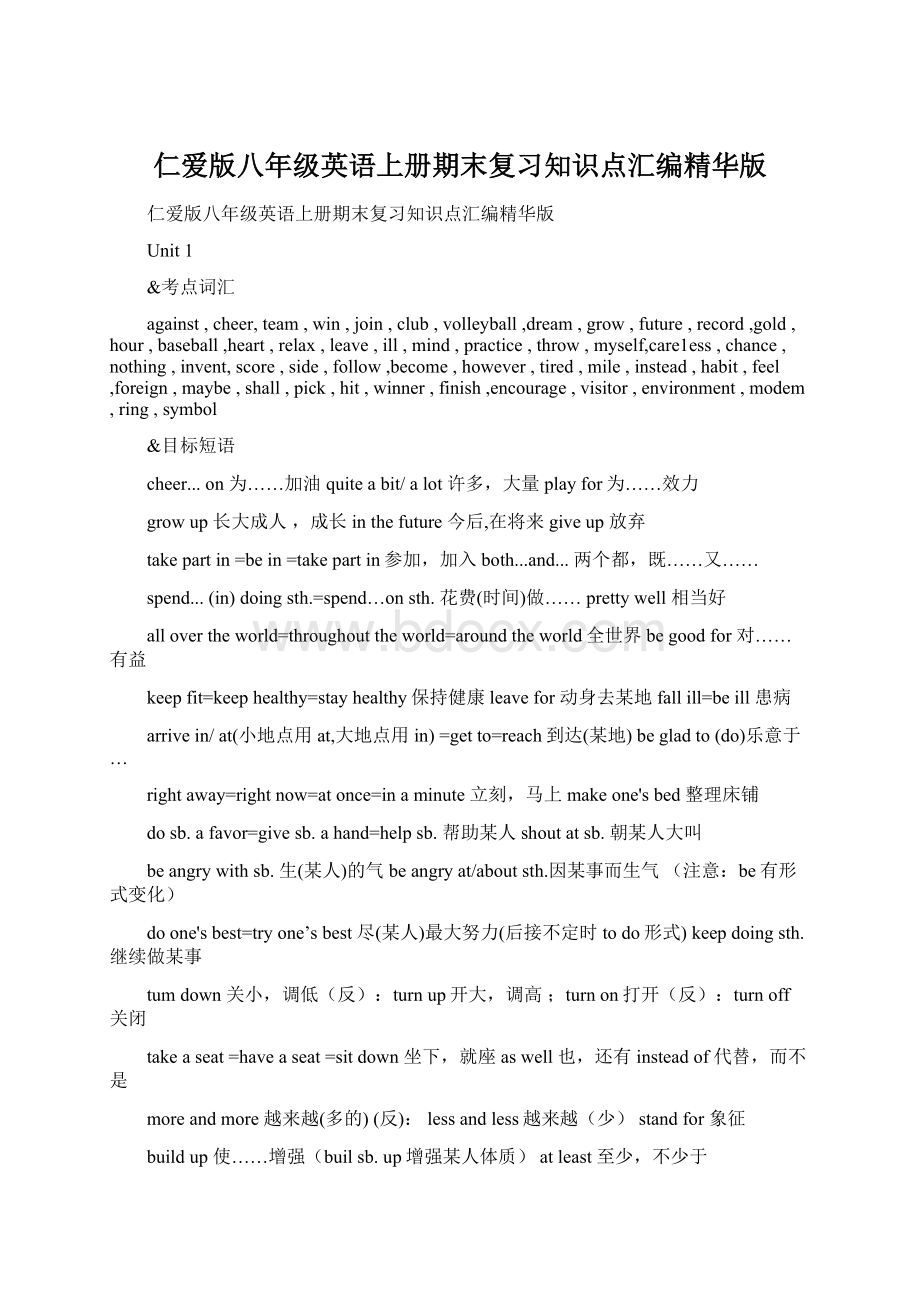仁爱版八年级英语上册期末复习知识点汇编精华版Word文件下载.docx
《仁爱版八年级英语上册期末复习知识点汇编精华版Word文件下载.docx》由会员分享,可在线阅读,更多相关《仁爱版八年级英语上册期末复习知识点汇编精华版Word文件下载.docx(26页珍藏版)》请在冰豆网上搜索。

—Ipreferrowing.
4.—Areyougoingtojointheschoolrowingclub?
—Yes,Iam./No,I'
mnot.
5.—Whatareyougoingtobewhenyougrowup?
—I'
mgoingtobeadancer.
6.Shespendshalfanhourdoingexerciseinthegymeveryday.
7.Theyaresurethatshewillwin.
8.—Michael,couldyoupleasedomeafavor?
—Sure.Whatisit?
9.—WouldyoumindifItryitagain?
—Certainlynot.Pleasedo.
10.—I'
msorryI'
mlateforclass.—That'
sOK.Pleasetakeaseat.
11.That'
sverykindofyou,butIcanmanageitmyself.
12.Whatdoyoumeanbysayingthat?
13.Wearesuretowinnexttime.
14.I'
lltakepartintheschoolmeet.
15.Therewillbeanotherexcitingrelayracethisafternoon.
16.I'
llbeabletotakepartintheOlympicGames.
功能意念
1.请求允许
—MayIcomein?
—Yes,please.
—Wouldyoumindteachingme?
—Notatall./Ofcoursenot.
—Wouldyoumindnotputtingyourbikehere?
—Sorry.I'
llputitsomewhereelse.
—Would/Doyoumindiflopenthewindow?
—You'
dbetternot./I'
msorry,it'
snotallowed.
—Couldyoupleasedomeafavor?
—Sure/Certainly.What'
sit?
—Can/Couldluseyourtelephone?
—Ofcourse,youcan.
2.道歉
Sorry./I'
msorry./Excuseme,please./Ibegyourpardon.
—I'
msorry.I'
mlateforclass.
—That'
msorryforwhatIsaid.—It'
snothing.
msorrytotroubleyou.—Nevermind.
msorryforlosingyourbook.—Oh,itdoesn'
tmatter,Ihaveanotherone.
3.约会
—Whenshallwemeet?
—Let'
smakeithalfpastsix.
—Whereshallwemeet?
—Attheschoolgate.
—WillyoubefreethisSunday?
—Yeah,IthinkIwill.
—Let'
smakeit4:
30.—Allright.Seeyouthen.
—Doyouhavetimethisafternoon?
=Areyoufreethisafternoon?
mafraidIhavenotimethen./Sorry,Iwon'
tbefreethen.ButI'
llbefreetomorrow.
—Couldwemeetat4:
30?
—Yes,I'
llbefreethen.
—Howabouttomorrowmorning?
(=whatabout,后接动词要用v.-ing形式)
—Allright.Seeyouthen.
语法精粹
1.掌握一般将来时begoingto/will+动词原形的用法。
2.学会使用Would/Doyoumind...?
的用法。
考点剖析
1.Isawyouplaybasketballalmosteverydayduringthesummerholidays.在暑假我看你几乎每天打篮球。
see是感官动词,后可接不带to的不定式或现在分词作宾语补足语。
即:
seesb.dosth.或seesb.doingsth.,但两者是有区别的:
不定式表示整个动作过程,而现在分词表示正在进行的动作(不管是不是全过程)。
如:
Isawhimcrosstheroad.我看见他穿过了马路。
(指我看到他离开这边人行道到另一边的人行道,穿过马路的整个过程。
)
Isawhimcrossingtheroad.我看见他正在穿越马路。
(强调看到的动作正在进行。
【链接】感官动词还有:
feel,hear,listento,lookat,find,notice,watch等。
Weoftenhearhimsinginhisgarden.我们经常听到他在花园里唱歌。
Canyoufeelthetrainslowingdown?
你能感觉到火车在慢下来吗?
2.—"
Whichsportdoyouprefer,cyclingorrowing?
骑车和划船,你更喜欢哪种运动?
—Ipreferrowing.我更喜欢划船。
prefer是指两者中偏爱或更喜欢一者。
其用法为prefer+动名词/名词/动词不定式。
—Whichdoyouprefer,anappleoranorange?
苹果和橘子,你更喜欢哪种?
—Ipreferanorange.我更喜欢橘子。
【链接】
(1)prefertodosth.更喜欢做某事。
Alotofpeopleprefertoliveinthecountryside.有更多人更喜欢住在乡下。
(2)preferdoingsth.todoingsth.比起做某事"
更喜欢做某事。
Ipreferreadingtowriting.比起写字,我更喜欢读书。
3.Areyougoingtojointheschoolrowingclub?
你要加入学校划船俱乐部吗?
当join作及物动词时,意为"
连接,接合,加入"
。
作"
加入"
解时,指的是成为某个团体、组织的一员;
joinsb.表示加人某人的行列,和某人一起。
Whendidhejointhearmy?
他什么时候入伍的?
Willyoujoinus?
你愿意加入我们吗?
(1)当join作不及物动词时,意为"
参加(某项活动)"
,通常结构为"
joinin+活动名称"
Wouldyouliketojoininthematch?
你要参加比赛吗?
(2)takepartin指参与某项活动,相当于bein或joinin+活动名称。
Itookpart/joinedinherbirthdaypartylastnight.昨晚我参加了她的生日晚会。
4.TheyareleavingforJapanthedayaftertomorrow.他们将于后天动身前往日本。
areleavingfor并不表示动作现在正在进行,而是表示动作将要发生。
某些动词的现在进行时可用来表示一个最近按计划或已安排好要进行的动作。
come,go,do,arrive,start,leave,return,have,stay,spend,sail,meet,fly等。
Areyoustayingheretilltomorrow?
你要在这儿一直待到明天吗?
5.Wouldyoumindteachingme?
请你教我,好吗?
Wouldyoumind(sb.)doingsth.?
是一个常用固定句型,表示"
请你做某事好吗?
倘若(某人)做某事你介意吗?
"
Wouldyoumindgivingmeahand?
介意帮我个忙吗?
(1)否定句为Wouldyoumindnotdoingsth.?
请不要做某事好吗?
Wouldyoumindnotsmokinghere?
请不要在这吸烟好吗?
(2)Wouldyoumindif...此句型用于请求允许或客气地请人做某事。
WouldyoumindifIopenthewindow?
我打开窗户好吗?
(3)Wouldyoumindsb.doingsth.?
Wouldyoumindmesittinghere?
也可以说成Wouldyoumindmysittinghere?
肯定回答:
Ofcoursenot./Certainlynot./Nevermind./No,notatall.
否定回答:
Yes,you'
dbetternot./SorryI'
mafraidnot.
6.Ididn’twanttomissthegoal,either.我也不想丢掉那个球。
“either”也,用于否定句后或否定词组后。
Petercan'
tgoandIcan'
t,either.彼得不能去,我也不能。
“Idon'
tlikeit.”“Meeither.”“我不喜欢它。
”“我也不喜欢。
”
此外,either还可指“两者中的任一个”。
Youcanparkoneithersideofthestreet.你可以将车停在这条街的任何一边。
Youcankeepeitherofthetwophotos.你可以保留两张照片中的任何一张。
7.We'
resuretowinnexttime.下次我们一定会赢。
besuretodosth.肯定要做某事(表将来)。
It'
ssuretorain.肯定要下雨。
【链接】besure+(that)从句"
确信……"
I'
msure(that)heisright.我确信他是对的。
8.Healthyeatinghabitsandrunninghelptobuildmeup.健康的饮食习惯和跑步帮助我强健身体。
buildup使……健康,增强......体质。
buildup是一个动词+副词的短语。
这类短语的宾语是代词时,代词必须放在动词和副词中间;
如果宾语是名词,则可放中间,也可放在副词后面。
此类短语有giveup,putup,cheerup,lookup,turnup,ringup,takeoff,wakeup,pickup,putoff,turnoff,seeoff,puton,cheeron,turnon,tryon,putaway,throwaway,workout,carryout,checkover,thinkover,turndown等。
9.Ihavegreatfunrunning.我从跑步中得到很大乐趣。
havefundoingsth.从做某事中获得乐趣。
ThistermwewillhavegreatfunlearningEnglish.
这个学期我们将从学习英语中获得很大乐趣。
类似的结构还有:
havedifficulty(in)doingsth.
haveproblem(s)(in)doingsth.做某事有困难
havetrouble(in)doingsth.
细比细看
1.playwith/playagainst/playfor
(1)Ourteamwill_______ClassThreenextSaturday.
(2)Agroupofkidswere_______aballinthestreet.
(3)DoesYiJianlian_______theDallasMavericksintheNBA?
【分析比较】playwith玩耍,游戏,玩乐,与……玩耍。
(2)题意为"
孩子们在玩球"
故填playingwith。
playagainst同……比赛。
(1)题意为"
两个队比赛",故填playagainst。
playfor为……效力。
(3)题意为"
易建联在NBA为达拉斯小牛队打球吗?
故填playfor。
2.arrivein/arriveat/reach/getto
(1)Whattimedidhearrive_______thevillage?
(2)Atlastwe_______thebasecamp(大本营).
(3)Youcaneasilyget_______thecitycenterfromhere.
(4)Theywillarrive_______Tokyointwodays.
【分析比较】arrive是不及物动词,后常接介词at或in。
arriveat+小地点,到达某个具体的地点,如城镇、车站、乡村、建筑物等。
他什么时候到达那个小村庄的?
故填at.
arrivein+大地点,到达某国家或大城市。
(4)题意为"
他们两天后到达东京。
故填in。
reach到达,抵达,是及物动词,后面直接接宾语,无须介词。
我们终于到达了大本营。
故填reached.get是不及物动词,其后接介词to.(3)题意为"
从这里你可以不费力地到达市中心。
故填to.
3.maybe/maybe
(1)_______heisathomenow.
(2)He_______wrong,butwe'
renotsure.
【分析比较】maybe和maybe都是"
也许,大概"
的意思,.maybe是副词,常位于句首作状语,句子中还有谓语动词。
也许他在家。
故填Maybe。
maybe是"
情态动词+be动词"
结构,句中没有其他谓语。
他可能错了,但我们不能确定。
maybe在句中作谓语,故填maybe。
4.leave/leavefor/leave...for
(1)He_______hishometownlastweek.
(2)Iam_______NewYorknextweektoseemygoodfriendsthere.
(3)Wewill_______Beijing_______Shanghai.
【分析比较】leave常用作动词,表示goaway(from)"
离开"
leaveaplace是指"
离开某地"
(1)题意为"
他上周离开了家乡。
故填leave的过去式left。
leavefor+地点名词,表示"
动身去前往."
.
(2)中由不定式所表达的意思可知下周我要去纽约,故填leavingfor.
leaveAforB,意为"
离开A地去B地"
.(3)题意为"
我们准备离开北京去上海。
故填leave...for。
5.tumon/turnoff/tumup/turndown/close/open
(1)—Paul,couldyouplease____theTValittle?
It'
stoonoisy.—Sorry,I'
lldoitrightnow.
(2)_________thelightswhenyouleave.
(3)_________theTV.Let'
swatchtheplaytogether.
(4)_________yourmouth,andsay"
Ah"
.
(5)Themusicwas_________loudandtheydancedcrazily.
(6)I_________myeyesagainstthebrightlight.
【分析比较】turnon与turnoff为反义词组,turnon打开,接通(电流、煤气、水等);
turnoff关掉,截断(电流、煤气、水等).turnup与turndown为反义词组,turnup开大,调高(音量、热量等);
turndown把……调低,关小。
close闭上,关,关闭(门窗、盒子等);
open开,打开,开启(门、窗、盒子等)。
(1)题由It'
stoonoisy.和alittle可知应填turndown;
(2)题由"
离开时要关灯"
可知应填Turnoff;
(3)题由"
让咱们一起看电视剧吧"
可知应填Turnon;
(4)题为"
张开嘴巴"
应用Open;
(5)题由"
loud"
以及"
他们疯狂地跳起舞来"
可知音乐被开大了,故填turnedup;
(6)题由"
以防强光的照射"
可知应是闭上眼睛,故填close。
6.shoutat/shoutto
(1)Thechildren__________thedriver,buthedidnothearthem.
(2)Ifyoudon'
tstop__________me,I'
11comeandhityou.
【分析比较】at和to与同一动词搭配时,意义有很大的区别。
shouttosb.表示"
大声叫某人"
多因距离远,声音小听不见。
孩子们对着司机喊叫着,但是他没听见。
,故填shoutedto。
shoutatsb.则表示"
生气地或故意地对某人大喊大叫。
(2)题意为"